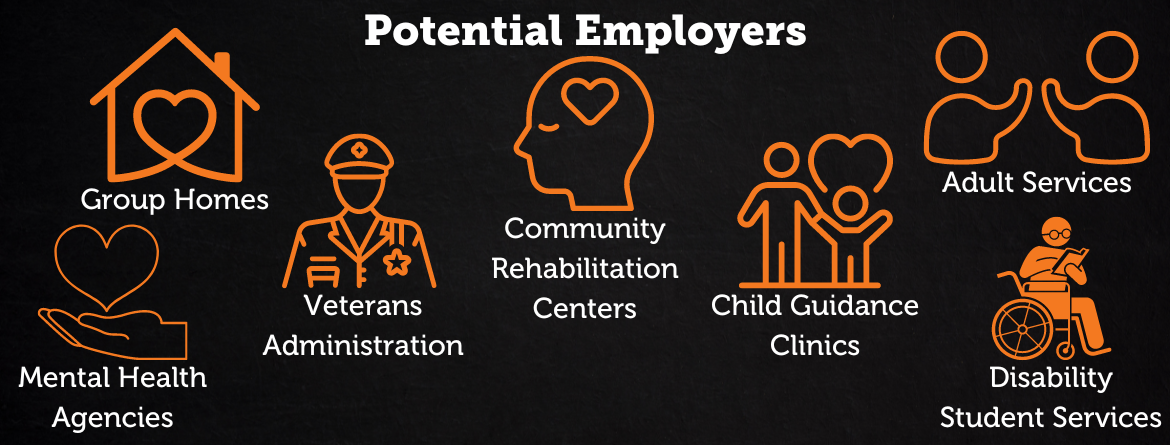Master of Counseling Degree (M.COUN.) - Clinical Rehabilitation Counseling - Pocatello and Meridian
About the Program
Clinical Rehabilitation Counseling is a systematic process which assists persons with physical, mental, developmental, cognitive, and emotional disabilities to achieve their personal, career, and independent living goals in the most integrated settings possible through the application of the counseling process. The counseling process involves communication, goal setting, the beneficial growth or change through self-advocacy, psychological, vocational, social, and behavioral interventions.
Program Information
Clinical Rehabilitation Counseling Program Objectives
- Develop culturally competent professional counselors prepared to serve individuals with chronic illness and/or disabilities to achieve their independent living goals and full community integration.
- Equip professional counselors with specialized knowledge, skills, and attitudes to work comprehensively and collaboratively with people with disabilities to achieve their personal, social, psychological, career, and independent living goals.
- Prepare professional counselors to use client-centered approaches to support people with disabilities in attaining optimal psychological, social, and vocational functioning within the context of their personal and professional goals, well-being, and perceptions of quality of life.
- Equip professional counselors with rehabilitative and psychotherapeutic treatment modalities to promote optimal biopsychosocial adjustment and adaptation to clients' chronic conditions and disabilities.
For the Master of Counseling (M.Coun.) degree, the student is required to complete the equivalent of at least four full semesters of resident graduate study beyond the bachelor's degree. The minimum for each program must total 60 semester hours.
The Idaho Counselor Licensing Board requires the following for licensable hours:
“Section 150 02. Supervised Experience Requirement. One thousand (1,000) hours of supervised experience in counseling acceptable to the Board. (7-1-93)
In the Department of Counseling, supervision by doctoral students who have received supervision training are viewed as acceptable to the Board. The Department of Counseling prefers that students seek out practicum and internship settings that have a licensed professional counselor first, before considering a site in which supervision is provided by a different mental health professional. Your development as a professional counselor occurs not only while in class at ISU but also during your clinical experiences outside of ISU. Mentoring by a professional counselor during your clinical supervision is a vital part of your emergent identity as a professional counselor.
- One thousand (1,000) hours is defined as one thousand (1,000) clock hours of experience working in a counseling setting, four hundred (400) hours of which shall be direct client contact. Supervised experience in practicum and/or internships taken at the graduate level may be utilized. The supervised experience shall include a minimum of one (1) hour of face-to-face or one-to-one (1/1) or one-to-two (1/2) supervision with the supervisor for every twenty (20) hours of job/internship experience. Face-to-face may include a face-to-face setting provided by a secure live electronic connection between the supervisor and supervisee. As stated under Subsection 150.01.a.iii. counseling practicum experience as opposed to job or internship experience shall be supervised at a ratio of one (1) hour of supervision for every ten (10) hours in the settings. For example: (3-29-12)
- A person in a twenty (20) hour per week job/internship who is receiving one (1) hour of individual supervision each week would accumulate one thousand (1,000) supervised hours in fifty (50) weeks to equal the twenty to one (20/1) ratio. (7-1-93)
- A person in a forty (40) hour per week setting with one (1) hour of supervision per week would still require fifty (50) weeks to equal the twenty to one (20/1) ratio. (7-1-93)
- A person in a forty (40) hour per week setting with two (2) hours of supervision per week would accumulate the one thousand (1,000) hours at the twenty to one (20/1) supervision ratio in twenty-five (25) weeks. (7-1-93)
- Until July 1, 2004, the supervision must be provided by a Professional Counselor or a Clinical Professional Counselor licensed by the state of Idaho. Effective July 1, 2010, supervision must be provided by a counselor education faculty member at an accredited college or university; Professional Counselor, registered with the Board as a supervisor; a Clinical Professional Counselor, registered with the Board as a supervisor; a Marriage and Family Therapist, registered with the Board as a supervisor; a Clinical Social Worker registered as a supervisor with the Board of Social Work; a licensed Psychologist; or a licensed Psychiatrist, licensed by the state of Idaho. Supervision by a professional counseling peer, however, may be acceptable to the Board if the peer/supervisory relationship include the same controls and procedures expected in an internship setting. (See Subsection 150.02.a.) For example, the relationship should include the staffing of cases, the critiquing of counseling tapes and this supervision must be conducted in a formal, professional, consistent manner on a regularly scheduled basis.”
Please note: Students are responsible for ensuring a site supervisor is registered with the IBOL prior to accepting a site for practicum or internship.
If you intend to be licensed or certified in a state other than Idaho, you are advised to:
- Review the licensing information for the program(s) below; and
- Contact the appropriate licensing agency in the U.S. states and territories where licensure is intended to ensure that you have the most up-to-date information about licensure requirements and confirm how an ISU program aligns with those requirements. Because requirements may change during the course of your program of study, we recommend that you check licensing agency requirements regularly to monitor whether any changes may impact your licensure plans.
- For more information please see the ISU license disclosure or the Department of Counseling license disclosure.
Careers in
- Individual and Group Counseling
- Case Management
- Medication Monitoring
- Crisis Intervention
- Program Planning
- Administration




